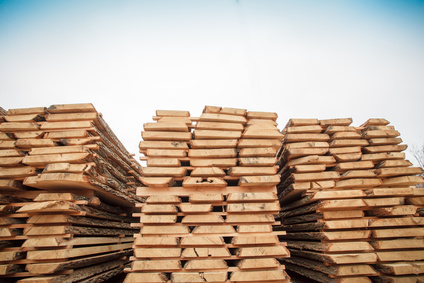Canadian wood producers face 25 per-cent tariff in border fight

Despite multiple legal setbacks before World Trade Organization and NAFTA tribunals, American softwood lumber producers are still calling for the imposition of limits and tariffs on Canadian imports, arguing that they represent unfair competition because they’re subsidized. If no new agreement is ratified by the deadline of Oct. 12, imports from Canada could be subject to tariffs of up to 25 per cent.
This would place Canadian producers and workers, who are struggling to recover from the last economic crisis, in an even more precarious situation. Residential construction is the main outlet for softwood lumber, and the economic slowdown of recent years has led to the loss of thousands of jobs. As for the American market, it accounts for fully 65 per cent of the industry’s total production. According to the latest figures, C$5.6 billion of exported products and over 19,000 jobs will be affected by the outcome of the negotiations and the American market.
The latest agreement on softwood lumber between the two countries, which came into effect in 2006, proposed two options to Canadian producers harvesting mainly public forests. The first was based on export charges going from 5 per cent to 15 per cent, while the second involved lower charges, but combined with a volume limit. The two kicked in whenever the price of softwood lumber was at or below US$355 per thousand board feet.
By isolating the different factors that can influence the demand for Canadian softwood lumber on the American market, it is possible to estimate the impact that these charges had. All in all, they cost Canadian producers over C$2 billion and also contributed to thousands of job losses.
American consumers, for their part, also get the short end of the two-by-four, since they had to get their wood from an alternative and more expensive source when the tariff barriers led to reduced Canadian imports. They were required to spend an additional C$6.36 billion over the period covered by this protectionist measure.
For the relatively small number of producers, the gains related to the imposition of tariff barriers are large, and justify the lobbying efforts required to maintain them. During the period covered by the latest Agreement, American producers’ market share increased considerably, taking up nearly all of the slack that was due to the drop in Canadian imports. American producers thus registered additional net earnings of C$4.63 billion.
In Canada, nearly all wood is harvested from public forests, whereas 90% of American softwood lumber comes from private forests. A NAFTA ruling indeed confirmed the existence of a subsidy for Canadian softwood lumber. However, it was below the threshold required to justify sanctions according to American law.
Nonetheless, to respond to the criticisms put forward by American producers, Quebec and British Columbia have implemented public auction mechanisms for determining the level of royalties paid for timber volumes. In theory, such a mechanism should allow producers in these two provinces to freely sell their softwood lumber on the American market in the next deal.
However, the weakness of the Canadian dollar relative to the American dollar and the recent reduction in the price of Canadian softwood lumber could threaten the market shares of American producers, who have an incentive to pressure the American government to impose tariff barriers once again.
The softwood lumber conflict highlights a fundamental aspect of protectionism: It concentrates benefits within a limited group, whereas costs are spread over a large number of economic actors. This therefore implies a distribution of market shares not based on the competitiveness of private companies, but based instead on the political connections of groups defending their interests in the corridors of power, to the detriment of consumers who end up with less choice and higher prices.
Alexandre Moreau is Public Policy Analyst at the Montreal Economic Institute and author of Viewpoint — Costs of Protectionism: the Case of Softwood Lumber. Jasmin Guénette is Vice-President of the MEI. The views reflected in this op-ed are their own.
____________________
Read more articles on the theme of "Regulations."

